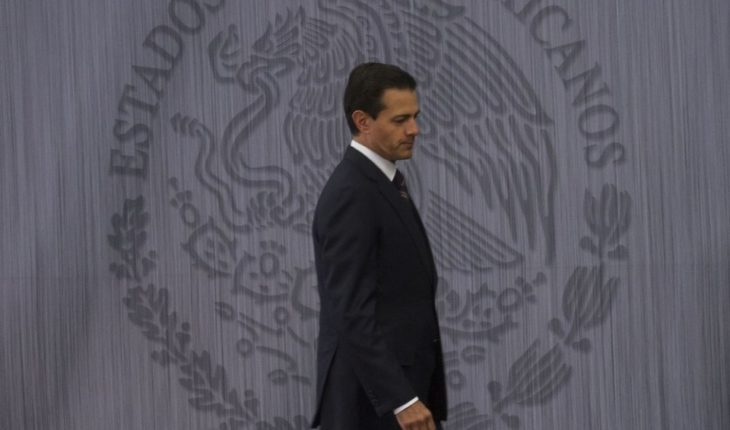During the six years of the administration of President Enrique Peña Nieto at least 41 units and agencies of the Federal Government used universities and television systems to allegedly divert 9.6 billion pesos of public resources, to through the scheme known as The Master Scam.
Among those involved are the Ministry of Foreign Affairs, Finance, Communications and Transport, Pemex, Sedesol, Sagarpa, Sedatu; agencies such as Cofepris, IMCINE, ISSSTE, Conagua, Conafor, Diconsa, CFE, IMPI, TRIFE, the National Banking and Securities Commission, the Institute of Management and Avalúos, and development banking such as Bancomext, Banobras and Nafin, among others.
In its reports from 2012 to 2018, the Federation Superior Audit (ASF) found that federal government units made agreements with 35 universities and public radio and television systems, to make alleged services of which there is no evidence of have been done.
Political and Mexican Anti-Corruption Animal followed up on the 2013 and 2014 audits and in the journalistic investigation The Master Scam revealed that companies subcontracted by universities were illegal or ghost public disappeared.
The journalistic investigation was published in 2017, but government agencies continued with the mechanism the following year, as revealed by the audit report to the last year of President Enrique Peña Nieto’s government, released last Thursday.
Public officials, directors and media systems directors did not stop the mechanism even by the twenty criminal complaints filed since 2014 and until 2018 by the Audit before the Office of the Attorney General of the Republic (PGR).
However, no denunciation has succeeded in reaching an investigation and sentencing to punish those responsible for the alleged fraud of public coffers.
Out of more than a hundred officials involved, only Rosario Robles, former holder of Sedesol and Sedatu, is in prison as a precautionary measure for allegedly lying in the direction of her residence. But in his case, the route of money to find the architects and beneficiaries of the mechanism is not even investigated, as he is only credited with the alleged crime of improper exercise of public service.
The Master Scam Never Stopped
The first case of outsourcing of companies occurred in 2011 with the works of the monument Estela de Luz, in which the government had made an agreement with TURISSSTE to do the work and it subcontracted the company III Servicios, which resulted in overcost and a den criminal uncitage in 2012.
However, the first time an educational institution was used was in 2012, when the National Council for Culture and the Arts (Conaculta), Diconsa, Infotec, Sagarpa, Cofetel, FOVISSSTE, the Ministry of Communications and Transport, INEA and SUPERISSSTE, made agreements with the Autonomous University of the State of Mexico to make so-called services.
The Audit noted that there was a likely damage to the purse of 350 million pesos because it was not proven that the digitization services for the Conaculta had actually been made. Hence he filed a criminal complaint in 2014.
However, the mechanism remained in place. In 2013 and 2014, 11 units that included Pemex, Sedesol, Banobras, Communications and Transport and even INEA, made agreements with eight public universities, and they outsourced 186 companies to supposedly do the services.
The Master Scam’s journalism investigation included reviewing all companies in eight sources of information and found that of them, 128 were irregular or ghosted, and yet received 3 billion pesos of public resources.
But the number has been increasing because the Tax Administration Service (SAT) has added more companies to its list of phantom companies in recent months so the amount reaches 4,613 million pesos from 144 illegal companies.
In the audits of the remaining years of the six-year year total 4 thousand 992 million pesos to be clarified, that is, the units and universities must explain the final destination, since the services supposedly paid did not exist. That is why, from the six-year period, among what was detected by the audit and the journalistic investigation add 9 thousand 605 million pesos of alleged diversion.
For the former auditor, Juan Manuel Portal, this mechanism was “a fraud”, since when reviewing the alleged services, they found that they were documents manufactured ex profeso and that there were bank transfers between different companies even without contracts by means to disperse resources.
In addition, universities charged a percentage of the total money received. According to journalistic research, only the eight universities involved in 2013 and 2014 gained a billion pesos in this scheme, which in itself means an overcost for services, even if they had been made since the institutions outsourced to companies.
One example is at the Autonomous University of the State of Mexico, which received 223 million 87 thousand pesos from FOVISSSTE for five agreements to supposedly “redesign” or simplify the processes of care for rightholders.
But the university did not have the capacity to provide the service, so it hired Inter-American de Negocios y Comercio, S.A. de C.V., which actually engages,according to its charter, in the sale of shoes. This company was given 15 million 389 thousand pesos.
He also hired three other companies—Icalma Servicios y Consultoría, S.A. de C. V., Consolidation of Administrative Services and Systems, S.A. de C.V. and Evyena Servicios, S.A. de C.V.—investigated by the SAT for irregular operations; and three others who are not registered with the Secretariat of the Economy.
And Sedesol, for example, to make services for the distribution of half a million pantries, the organization of events and survival checks of beneficiaries of social programs, made agreements with the Autonomous State of Mexico and Morelos, but these they outsourced to companies, which in turn dispersed resources into a score of companies and they gave 698 million pesos to one last.
And in 2018… Also
The Secretariat of Public Education is one of the units that had such agreements during 2013, 2016 and 2018. Prior to the publication of La Estafa Maestra, the unit sent a response to this medium in August 2017 warning that the then holder, Aurelio Nuño had instructed the suspension of such agreements.
However, in the most recent Audit report, the SEP again made agreements with the Autonomous University of Nuevo León (UANL) and the Polytechnic of Sinaloa.
In the first case it was for maintenance to “telecommunications and servers; as well as the provision of server infrastructure equipment for data processing, storage, virtualization and backups,” but the university “subcontracted a moral person for 17 million pesos, of which the contracts signed with 23 natural persons, as well as equal number of the reports of those persons, detecting that the signatures contained in both documents are different even if they are the same person,” the audit says.
At the second university, they were supposed to do teacher training, but the Audit found that “no evidence was presented” that the activities had been carried out.
In 2018 the Polytechnic University of Huatsuco was also added, which made agreements with the National Banking and Securities Commission, the Institute of Administration and Appraisals and is therefore presumed to be a likely damage to the erario of 91 million pesos.
The Autonomous University of Chapingo had agreements with the Conafor, Diconsa and Sagarpa that add up to 35 million pesos to be clarified and the Instituto Superior de Casamaloapan that must clarify the fate of 282 million pesos of the agreements with Capufe, Cofepris, Sedatu, Conagua and Bancomext.
The new government continues with the same law
The realization of agreements between units and universities is legal. This is an exception in the procurement of services provided for in Article 1 of the Procurement Act, since when signing agreements between public administration authorities to provide services to each other directly and to avoid tendering.
The only ‘lock’ is that the contracted party, the universities in this case, cannot outsource to third parties for more than 49% of the resources it receives from the secretariats of state. However, in the 70 agreements analyzed in The Master Scam, universities violated Article 1 of the Procurement Act, and outsourced to companies for more than 90% of the resources to keep 10% as a ‘commission’, which also earned them for a billion pesos just for ‘bridge’ with companies.
None of the fraudulent agreements were signed by the holders of the 11 government secretariats where million-dollar detours to phantom companies occurred. This has been constantly used by secretaries of state such as Rosario Robles, who led Sedesol, first, and is now in the Sedatu, to delineate responsibilities in the diversions identified in both units by the Superior Audit of the Federation (ASF).
That is why, in September 2018, Senators Ricardo Monreal Avila and Freyda Marybel Villegas Canché proposed a reform of the Procurement Act so that this type of agreements would be signed by the owners of the units, so they would assume the whole responsibility for possible diversion or mismanagement of public resources.
However, this initiative remained in the freezer, as was the proposal by the senator perredista, Juan Manuel Fócil Pérez, who even went further and propI use the removal of the exception.
What we do in Animal Político requires professional journalists, teamwork, dialogue with readers and something very important: independence. You can help us keep going. Be part of the team.
Subscribe to Animal Politician, receive benefits and support free journalism.
#YoSoyAnimalEl title Master Scam: not a day in EPN’s sixth-day deviate public resources appeared first in Political Animal.





